Prawa pacjentów muzułmanów w świetle ustawodawstwa polskiego, ze szczególnym uwzględnieniem ustawy o gwarancjach wolności sumienia i wyznania
Rights of Muslim patients in the light of Polish legislation, with special regard to the Act on the guarantees of freedom of conscience and religion
Author(s): Katarzyna Krzysztofek-StrzałaSubject(s): Law, Constitution, Jurisprudence, Constitutional Law, Civil Law, Canon Law / Church Law, Sharia Law
Published by: Katolicki Uniwersytet Lubelski Jana Pawła II - Wydział Prawa, Prawa Kanonicznego i Administracji
Keywords: religious freedom; patient; Republic of Poland; Islam; Sharia law; freedom of conscience and religion; medical facility;wolność religijna; pacjent;Islam; szariat; wolność sumienia i wyznania;zakład leczniczy;
Summary/Abstract: In the Third Republic of Poland, which represents friendly separation between the state and the church, the freedom of conscience and religion is one of the basic human rights and is guaranteed both at the constitutional and statutory level. This right creates the freedom of manifesting religious beliefs and the right to pastoral care at every place. Due to the fact that religious freedom stems from the inherent dignity of the human being, it is guaranteed to everyone regardless of their nationality, race, health or beliefs.In view of the growing number of Muslims staying on the territory of the Republic of Poland, it seems reasonable to look at the scope of their rights in the field of religious freedom in a special situation that is difficult for every person – being a patient in a medical facility. The topic in question is especially relevant given the specificity of Sharia law, which regulates not only the strictly legal matters, but also the issues from the sphere of everyday life of a Muslim that give rise to the need to comply with a number of rules, also applicable in a situation of undergoing hospital treatment.The starting point for the article is the Act on the guarantees of freedom of conscience and religion and the rights it ensures for persons in medical facilities. These rights are confronted with the views of Sharia law with regard to the treatment that can be accepted by Islamic patients. The article discusses, among others, the issues related to respecting a Muslim’s right to be visited by their family, the right to fast, pray or eat certain foods. The analysis has led to the conclusion that medical personnel should, to the fullest extent possible within the constraints of Polish law, ensure Muslim patients conditions compatible with the requirements of their religion. However, because of the fact that the right to religious freedom is not an absolute one, the limit of this freedom must always be the good of patients and, above all, the religious freedom of others – whether medical personnel or patients with different religious beliefs.
Journal: Studia z Prawa Wyznaniowego
- Issue Year: 2019
- Issue No: 22
- Page Range: 135-151
- Page Count: 17
- Language: Polish

